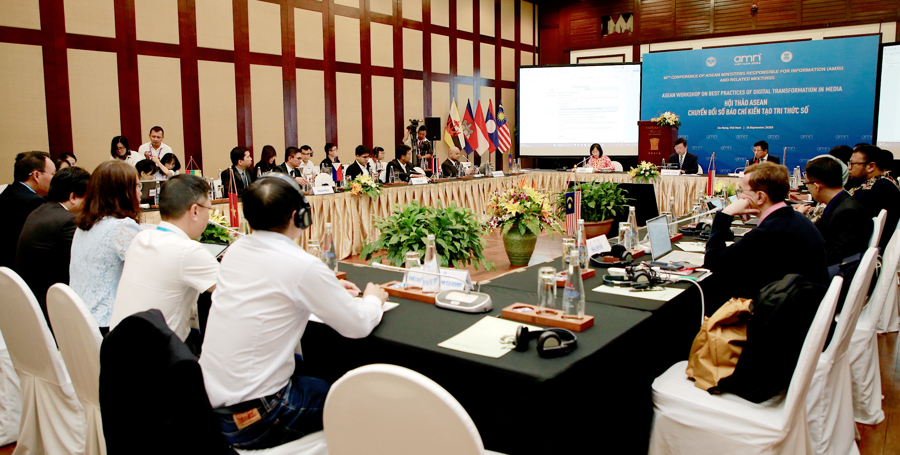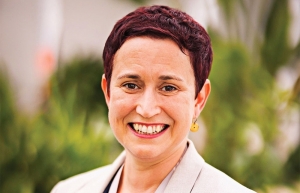Vietnam's journalism faces revenue drain to global platforms
 |
Within the framework of the conference held from September 20-23, a pivotal symposium titled "ASEAN Digital Media Transformation: Crafting the Digital Knowledge" took centre stage.
Hosted by Vietnam's Ministry of Information and Communication (MIC) in the coastal city of Danang, the gathering emphasised the theme "Communication: From Information to Knowledge for a Resilient and Adaptive ASEAN." Subsequently, on September 23, the 7th AMRI+3 conference was held, bringing together delegates from China, Japan, and South Korea.
Luu Dinh Phuc, director of the Authority of Press under the MIC said, "Half the advertising value is flowing into pockets of cross-border platforms."
He said that Vietnam currently housed over 800 press agencies, producing close to one million articles daily. This vast trove of data, if correctly harnessed using digital applications, offers profound insights into user behaviours.
"Transforming this massive information cache into a digital data platform can help extract the latent knowledge," Phuc said.
The communication sector, generating revenues nearing $4 billion, stands as a goldmine for Vietnam. However, the alarming diversion of half of its advertising value to international digital platforms and social networks is causing local press agencies to lose potential income.
The solution, many believe, lies in digital transformation and technological advancements to ensure a level playing field. This would cultivate a robust media ecosystem that can competently support local media against cross-border platforms.
As the global momentum shifts towards digital transformation, local press agencies and media must evolve or risk obsolescence. This change, necessitating collective efforts from institutions, leaders, and media entities, requires robust government policies promoting domestic digital platforms.
Vietnam's proactive response to the digital media transition has been apparent. The prime minister, in April 2023, approved the Digital Media Transformation Strategy until 2025, with a vision towards 2030, marking a significant roadmap for the nation's digital media transition. The MIC has also set action plans in motion to realise this strategy.
Addressing the gathering, Indonesia’s Ministry of Communication and IT representative remarked, "Digital transformation is inevitable. It's about amplifying the media's capacity to garner audience shares from social platforms and preserving traditional values alongside modernising the media." This sentiment was echoed across the board.
Vietnam has further unveiled tools to assess the development of its press sector.
These will help media agencies to plot their digital transformation, devising tailored strategies for the future. Highlighting the importance of a collective ASEAN endeavour, the Authority of Press proposed the creation of an ASEAN Digital Media Maturity Index.
Such an index would provide a shared set of criteria for media agencies across the region. These proposed metrics would assist in gauging and monitoring the maturity of digital media transformation within ASEAN.
Highlighting the urgency of the digital transformation, Deputy Minister of Information and Communications Nguyen Thanh Lam said, "The communication sector cannot remain an observer. The digital transition for media entities is not just about survival but revitalising the whole sector."
A representative from Brunei shed light on their ambitions to become a "smart nation," concentrating on three core missions: digital governance, digital economy, and digital society. This approach would culminate in a responsible and innovative digital media ecosystem.
Brunei's representative also voiced the collective ASEAN aspiration, "We hope for strengthened collaboration with the digital industry, especially in sharing information on new digital platforms for the media and communication agencies."
Additionally, the ASEAN Ministerial Conference on Information saw the organisation of an ASEAN forum centred on addressing and managing misinformation in cyberspace, facilitating open exchanges among various management bodies.
 | BIS standards creating global citizens for Vietnam British International School Ho Chi Minh City is striving to push its students towards being true citizens of the world. Louise Bishop, the school’s director of Admissions and Marketing, talked to VIR’s Kim Hanh about the school’s inside philosophy to offer the best global education and training solutions for students in Vietnam. |
What the stars mean:
★ Poor ★ ★ Promising ★★★ Good ★★★★ Very good ★★★★★ Exceptional
Related Contents
Latest News
More News
- Tet event in Japan celebrates success of 14th National Party Congress (January 25, 2026 | 10:04)
- 14th National Party Congress wraps up with success (January 25, 2026 | 09:49)
- Congratulations from VFF Central Committee's int’l partners to 14th National Party Congress (January 25, 2026 | 09:46)
- List of newly-elected members of 14th Political Bureau announced (January 23, 2026 | 16:27)
- 14th Party Central Committee unanimously elects To Lam as General Secretary (January 23, 2026 | 16:22)
- List of members of 14th Party Central Committee announced (January 23, 2026 | 09:12)
- Highlights of fourth working day of 14th National Party Congress (January 23, 2026 | 09:06)
- Press provides timely, accurate coverage of 14th National Party Congress (January 22, 2026 | 09:49)
- Press release on second working day of 14th National Party Congress (January 22, 2026 | 09:19)
- Minister sets out key directions to promote intrinsic strength of Vietnamese culture (January 22, 2026 | 09:16)

 Tag:
Tag:



















 Mobile Version
Mobile Version